 |
| Dorze Tribe |
This year my eldest daughter, the Golden Princess, turns 21 and it’s rumoured that I shall turn 50
– rumours I strongly deny for all the good it will do. Occy and I agreed that to
celebrate such heinously wonderful milestones we should plan a family
expedition to the place our children are least likely to travel to on their own
in the next decade – Africa.
The first country we will visit is Ethiopia. We will spend
time visiting the ‘Hidden Tribes’ of the Omo Valley. These are various tribes
that have resisted Westernisation and still live in a completely traditional
way. For thousands of years the Omo Valley in southern Ethiopia was a
crossroads for droves of people migrating to new lands. Today, it is
undoubtedly one of the most unique places on earth because of the sheer
diversity of tribal groups that live in this remote area of the Great Rift
Valley. Just the name – ‘The Great Rift Valley’ – conjuers images of great
white hunters, Karen von Blixen and Tarzan ;-) The Mursi whose women insert
large clay plates in their lower lips, the Hamer who scar and paint their
bodies in a mark of their culture and the Karo tribe who paint their faces and
bodies with white chalk and mix red clay with butter and feathers to decorate
their hair with, are just a few of the fifteen different tribes inhabiting this
area. Getting to them is no easy task either as there are no roads as such,
only pothole filled tracks, and plan A must always be backed up with a plan B
& possibly even C. They are so cut off that they have no written languages
or calendars (an Omo “clock” is a string with knots tied to indicate the number
of sunsets before a gathering or ceremony).
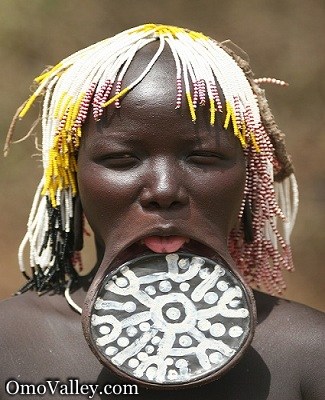 |
| Mursi woman Photo courtesy of OmoValley.com |
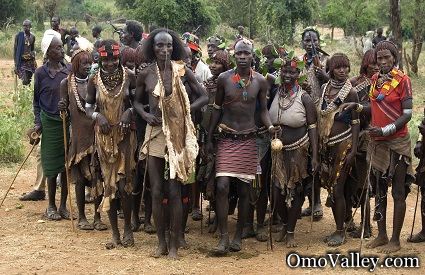 |
| Hamer tribe - photo courtesy of OmoValley.com |
 | |
| Karo man - with the only bit of westernisation that is ubiquitous throughout the valley - the AK-47 | Photo courtesy of flickeflu.com |
Unfortunately this
year the massive Gilgel Gibe III Dam is scheduled to begin operations several
hundred miles upriver. This trip is an
echo of our China trip where we sailed down the Yangtze River witnessing the
impending destruction of entire villages due to the controversial Yangtze River
Three Gorges Dam. In a later trip to Egypt we had witnessed the after effects
of the Aswan Dam on the Nile River where the entire Pharaonic temple of Abu
Simbel had been moved to higher ground to avoid the impending flooding the dams
construction brought. Although this dam will
more than double electrical output in Ethiopia, where less than two
percent of the rural population has access to the grid, as many as 200,000
indigenous people who rely on the Omo’s natural flood cycles, and whose land
may now go dry, may be displaced. Many of the tribes are shockingly unaware
that this is happening.
Admitting I’m having a First World Crisis, as opposed to a
mid-life crisis – I’m not rushing off to buy sports cars or find a new husband –
Occy decided we should seize the opportunity to get a reality check about what’s
really important in life (like celebrating life instead of lamenting turning 50)
by doing some humanitarian work in the course of our expedition. At each village we stop at we plan to offer
whatever basic medical services we can to people who may be hundreds of miles
from the nearest doctor or hospital. We are asking pharmacies to donate ‘out of
date’ but still usable medications and wound care items, particularly things
like antibiotic eye drops.
 |
| Patients of the Addis Ababa Fistula Hospital |
A fistula is a tear (hole) that develops between either the rectum and vagina or the bladder and vagina after severe or failed childbirth, when adequate medical care isn’t available, causing permanent incontinence and the social stigma that comes with it.
Around
18,000 Ethiopian women face obstructed labour each year. Half of them will die.
The other half will lose their baby and gain a fistula and the terrible
consequences of this condition. Training midwives is so important as a fistula
prevention strategy – to give young Ethiopian women access to a clean, safe
birth with a skilled birth professional by her side. Dr Hamlin’s dream is to
provide a midwife in every village of Ethiopia and our family hopes to raise awareness
and enough funding to provide training for at least 1-2 midwives (stay tuned
and I’ll let you know in the next few weeks how you can help).
Occy is also
on a mission to recycle the dressing packs that get used in his emergency
department. Unfortunately, at the moment in hospitals around the country these
sterile packs are disposed of once they are used once, but could easily be
cleaned and re-sterilised. We hope to ship as many as we can to the Fistula
hospital. The sub-adults are all very excited about our expedition and humanitarian
‘project’. I think as part of my mission in bringing my children up to be kind,
tolerant, helpful citizens with empathy in this world, this expedition will
help them to embrace the uniqueness of peoples, cultures and traditions
that are more ancient but as valuable as their own, no matter how unsettling or
extreme the conditions may be to achieve this. Also to instil in them the ability
to want to fight the good fight for what is valuable and precious and should be
championed, be that a woman’s dignity or the preservation of a culture or the
preservation of an animal – yes, a trek to visit Dian Fossey's gorillas in
either Rwanda,Uganda or D.R.of Congo depending on where the families are on the particular day we trek, is also happening on this expedition, but more on that later.
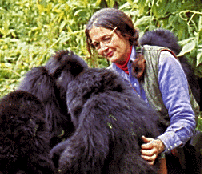 |
| Dian Fossey with her gorillas |


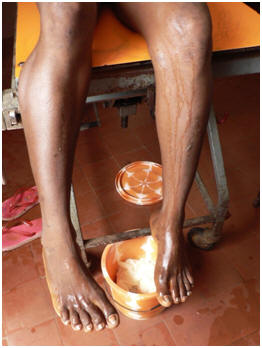
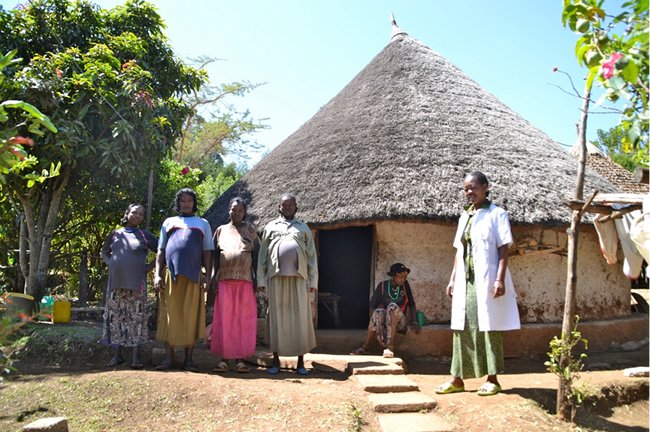
No comments:
Post a Comment